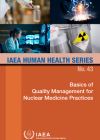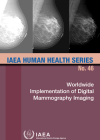Non-communicable diseases such as cancer and cardiovascular disorders kill millions of people each year, with numbers increasing particularly in low- and middle-income countries. The IAEA has established the Human Health Programme to support Member States in using nuclear techniques to prevent, diagnose and treat such diseases.
Human Health Programme
From prevention to diagnosis and therapy
The Human Health Programme provides a holistic approach to the prevention, diagnosis and treatment of non-communicable diseases, covering four main support areas: nutrition; diagnosis and follow-up; radiation oncology and radiotherapy; and quality assurance.
Good nutrition is the foundation of human wellbeing, a value also recognized by the United Nations Sustainable Development Goals. The IAEA Human Health Programme, as part of its work on prevention and healthy living, supports the Goals through the application of nuclear techniques, in particular using stable isotopes. The Programme focuses on:
- infant and young child nutrition;
- childhood obesity;
- maternal and adolescent nutrition;
- nutrition and ageing;
- diet quality; and
- the assessment of environmental health effects.
In the area of diagnosis and follow-up, the Human Health Programme helps establish new, and improve existing, nuclear medicine and diagnostic imaging facilities. It also assists IAEA Member States in strengthening their capabilities to address major health problems, such as cancer and cardiovascular diseases. This goal is achieved by:
- developing, evaluating and introducing appropriate diagnostic and therapeutic modalities that use nuclear medicine and diagnostic imaging technologies;
- transferring updated technology to Member States;
- assist Member States with the establishment of quality management systems in nuclear medicine;
- providing education and training; and
- offering web-based e-learning tools and continuing professional development.
The Programme provides technical expertise in radiation oncology and promotes and coordinates research in clinical radiation oncology and applied radiation biology. Technical expertise in these fields is provided by:
- ensuring an optimized delivery of radiotherapy and the effective and efficient utilization of current and future advanced cancer treatment technologies;
- assisting Member States in modernizing and establishing new radiotherapy facilities, brachytherapy services, as well as new technologies and education programmes for radiotherapy professionals;
- supporting IAEA technical cooperation projects that directly address cancer management worldwide; and
- enhancing Member States’ capacities to establish sound policies that regulate the delivery of radiotherapy and cancer treatment.
Quality assurance to ensure patient safety
The methods used for imaging and treatment require accurate dosimetry and complex quality assurance procedures. The technology used for those methods have become increasingly complex, which as a result is also expected to increase the need for appropriate quality assurance services, to ensure that appropriate clinical outcomes can be achieved without compromising the safety of the patient.
The IAEA develops internationally harmonized dosimetry and quality assurance codes of practice, guidelines and recommendations for best practice, and provides guidance to Member States for their implementation. It also maintains a dosimetry laboratory, which plays a key role in establishing and disseminating best practices in the safe and effective use of radiation for the diagnosis and treatment of cancer. The laboratory offers important quality assurance services related to medical physics and dosimetry, including the calibration of reference standards used for dosimetry measurements and dosimetry auditing services.








